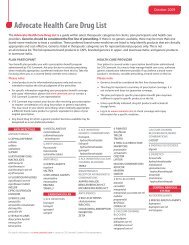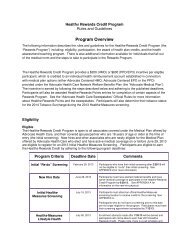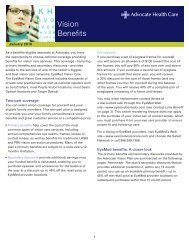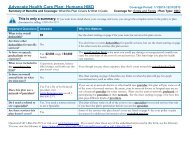PPO/DRP Medical Plan - Advocate Benefits - Advocate Health Care
PPO/DRP Medical Plan - Advocate Benefits - Advocate Health Care
PPO/DRP Medical Plan - Advocate Benefits - Advocate Health Care
You also want an ePaper? Increase the reach of your titles
YUMPU automatically turns print PDFs into web optimized ePapers that Google loves.
You agree that you will not attempt to avoid<br />
this <strong>Plan</strong>’s recovery rights by designating all (or<br />
any disproportionate part) of any recovery as<br />
exclusively for pain and suffering.<br />
Failure of the covered person to provide the <strong>PPO</strong>/<br />
<strong>DRP</strong> administrator such notice or cooperation,<br />
or any action by the covered person resulting<br />
in prejudice to this <strong>Plan</strong>’s rights will be a<br />
material breach of this <strong>Plan</strong> and will result in the<br />
covered person being personally responsible<br />
to make repayment. In such an event, this <strong>Plan</strong><br />
may deduct from any pending or subsequent<br />
claim made under this <strong>Plan</strong> any amounts the<br />
covered person owes this <strong>Plan</strong> until such time as<br />
cooperation is provided and the prejudice ceases.<br />
<strong>Health</strong> Insurance Portability and<br />
Accountability Act of 1996 (HIPAA)<br />
This Federal law imposes requirements on<br />
employer health plans concerning the disclosure<br />
of certain individual health information, known as<br />
Protected <strong>Health</strong> Information (PHI). PHI includes<br />
individually identifiable health information that<br />
relates to your past, present or future health<br />
treatment, or payment for health care services.<br />
The <strong>PPO</strong>/<strong>DRP</strong> will be administered to comply<br />
with HIPAA.<br />
Additional information is available online at<br />
www.advocatebenefits.com (click on <strong>Benefits</strong><br />
Information > HIPAA).<br />
Integrating <strong>Benefits</strong> with Medicare<br />
Individuals who are eligible for Medicare<br />
receive Medicare Part A at no cost. Participation<br />
in Medicare Part B is available as voluntary<br />
coverage. If you become entitled to Medicare<br />
and are still actively at work, you may continue<br />
coverage under the <strong>PPO</strong>/<strong>DRP</strong> at the same level of<br />
benefits and contribution rates. This also applies<br />
to dependents who become entitled to Medicare<br />
while you are still actively at work.<br />
42<br />
If you and/or your dependent also enroll in<br />
Medicare, the <strong>PPO</strong>/<strong>DRP</strong> will be the primary plan<br />
and Medicare will provide you with secondary<br />
health care coverage. If you and/or your<br />
dependents choose to discontinue coverage<br />
under the <strong>PPO</strong>/<strong>DRP</strong> and enroll in Medicare, no<br />
benefits will be payable from the <strong>PPO</strong>/<strong>DRP</strong>.<br />
What happens to my benefits once I become<br />
eligible for Medicare?<br />
Once you become eligible to receive Medicare<br />
benefits, you may make a choice. You can<br />
either receive primary benefits from the<br />
<strong>PPO</strong>/<strong>DRP</strong>, or you can receive benefits from<br />
Medicare. If you choose Medicare as your<br />
primary coverage, you cannot receive benefits<br />
under the <strong>Plan</strong> as well.<br />
Special integration rules apply for persons<br />
entitled to Medicare by reason of disability or<br />
with end-stage renal disease.<br />
Medicare Coverage for Disabled Individuals<br />
If you or your eligible dependent is totally disabled<br />
and not currently actively employed, Medicare will<br />
provide primary medical coverage. Once you or<br />
your dependent is determined to be totally disabled<br />
by Social Security rules, the disabled individual<br />
should apply for coverage under Medicare Parts<br />
A and B. In these situations your medical plan<br />
coverage option is the secondary payor.<br />
Medicare Coverage for Individuals with<br />
End-Stage Renal Disease<br />
In all situations involving end-stage renal disease<br />
(ESRD)—regardless of age or Medicare status—<br />
your medical plan coverage option is the primary<br />
payor of medical expenses for the first 30 months<br />
of entitlement to Medicare because of ESRD. After<br />
the first 30 months of ESRD entitlement, Medicare<br />
is the primary payor, and your <strong>Advocate</strong> medical<br />
plan coverage option is the secondary payor.

















